Written by Dr. Dianne Ashton, Professor in the College of Humanities and Social Sciences
Originally written in December 2020, updated in December 2022
What does Hanukkah celebrate?
Hanukkah celebrates the rededication of the Jerusalem Temple after a battle that began in 167 b.c.e. reclaimed it from the Hellenized Syrian Empire of Antiochus IV. Antiochus had placed a statue to Zeus in the Temple, initiated sacrifices to Zeus there, and plundered the funds for widows & orphans and for the Temple’s functioning that were stored there. In an effort to further Hellenize Judea, he forbade bible study and banned basic rites of Judaism such as circumcision. By defeating Antiochus IV and rededicating the Temple, the Jewish forces ensured that Judaism would continue to be practiced.
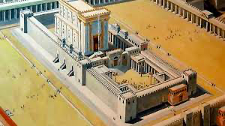
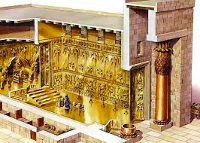
Terms
Hanukkah
The Hebrew word “Hanukkah” means dedication, and that is the theme of the holiday. The word begins with a Hebrew letter that has no corresponding sound in English. The letter – khet — is pronounced with a back-of-the-throat sound. Over a 150 years ago, American Jews began indicating that sound with “ch”, when writing about Hanukkah in English, despite the fact that people who were not already familiar with the way Hanukkah is supposed to be pronounced would sound it like the “ch” in “chair,” and so inevitably mispronounce it. At the end of the 19th century, the New York Times began using “Hanukkah” because the “h” sound is closer to “kh” than is “ch”, and that spelling has also become common in the United States.
Menora
The key event in the dedication of the Jerusalem Temple after Antiochus’s forces were defeated was the lighting of the large oil lamps, called menorahs, that symbolized the presence of God, and which were supposed to remain lighted at all times. Those lamps each had seven branches holding oil and wick, symbolizing the seven days of the week of creation. The Temple’s menorahs stood several feet tall, but today’s Hanukkah menorahs used in homes are small items that usually sit on tabletops or in window sills.
In the story of those events told at Hanukkah, that rededication seemed unlikely for two reasons. First, it was unlikely that the Jewish forces would have prevailed against the Syrians. Second, the battle for the Temple destroyed the jars that stored oil for the lamps so that only a few drops could be found for that first relighting. It would take time to produce more, which would leave the lamps dark again. But, the story goes, a miracle occurred and that tiny bit of oil lasted for 8 days until more oil was ready for use. Today, Hanukkah’s central ritual is the lighting of a special Hanukkah menorah which has eight branches, commemorating that miracle. Brief blessings are recited praising God and the ancient miracles. The holiday of Hanukkah lasts eight days, and the menorah is lighted each night at sundown. It begins with one light – using either candles or oil & wicks—and the light of the menorah grows with each night as more candles are lighted. Jews light Hanukkah menorahs in their homes and in synagogues.
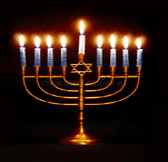
Maccabees
The heroes of the battle for the Jerusalem Temple and the defeat of Antiochus IV were a family of brothers who came to be called Maccabees, after their leader, Judah, who was called “the hammer.” Their father, Mattathias, was a rural priest who did not work in the Temple, but, nonetheless, came from a priestly family and had some religious authority.
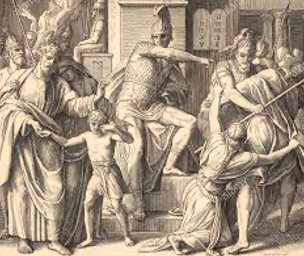
A minor festival
Hanukkah is designated a minor festival. Judaism has many important occasions throughout the year, the most significant being the Sabbath (each seventh day – Saturday), and the solemn days of Rosh Hashanah and Yom Kippur in early autumn. On each of those holidays, Jews are required to refrain from ordinary work and to participate in communal prayer in the synagogue. Hanukkah has neither of those requirements.
Holiday rules were standardized in late antiquity by early rabbis. After the success of the Maccabean revolt, Judah Maccabee’s family, called Hasmoneans, had stepped in as Temple priests, and also as political leaders after defeating Antiochus IV. By the time the Jerusalem Temple was destroyed a second and final time – this time by the Roman Empire in 70 c.e. — the Hasmoneans had held power in Judea for almost two centuries. The rabbis aimed to curb Hasmonean power by limiting the prestige of the holiday in which Hasmonean ancestors played a key role. And, after another Jewish revolt against Rome in 135 c.e. not only failed, but resulted in large scale Jewish exile from Judea, rabbis hoped to diminish the appeal of military revolts and to quell Jewish hopes for independence and rebuilding the Jerusalem Temple yet another time.
The Arch of Titus in Rome commemorates the destruction of Judea and depicts roman soldiers carrying off a menorah from the Temple.
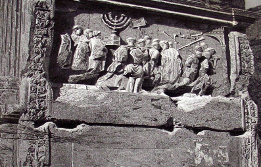
Today, Hanukkah offers Jews a time to recall the ancient heroes, the Jerusalem Temple, and the hope for miracles that the holiday offers. While the early rabbis diminished Hanukkah’s military resonance, they enhanced its significance as a recollection of God’s rescue. They encouraged Jews to sing songs and rejoice. Around the globe, people mark the shortened days of early winter with rituals that feature the light and warmth of fires. Hanukkah serves that purpose for Jews.
Over the last two thousand years, Hanukkah has taken on larger cultural significance, despite its small stature in the religious year. With menorah lightings at sunset and near dinner time, special foods emerged. In Eastern Europe, where few green vegetables are available in December, fried potato pancakes –“latkes”—became the favorite. Around the globe, Jewish families and clubs sing holiday songs. Children play games with spinning tops. In the twentieth century, American Jews added gifts for children to the holiday’s fun. As days reach their shortest each year, Hanukkah arrives to light up Jewish homes and synagogues with remembrance and songs.
Ways to support Jewish Communities
Recognize Christian privilege
Christian privilege shows up in mainly Western countries, and is a set of advantages that benefit Christians, while people affiliated with other religions or no religion are othered and marginalized for practicing their faith/beliefs. Christian readers can recognize Christian privilege by reflecting on the following examples: your workplace/school recognizes major holidays; you can wear symbols of your religion without being stereotyped as dangerous, and politicians who create and uphold laws are likely to share your faith.
Consider students and colleagues
Realize that people celebrate a variety of holidays during this time of year, and some people choose to celebrate none. Be respectful of these differences by taking an interest in other people’s traditions and making them feel welcome. Don’t be afraid to ask people what holidays they celebrate. However, do not assume all students or colleagues of a certain background know about and are interested in talking about a particular holiday and stir away from tokenizing an individual as the “authority” or main possessor of knowledge about a holiday’s history and customs.
Celebrate and Amplify Jewish Culture
The Jewish community has an abundance of pride and passion, as such, seek to celebrate, not appropriate Jewish culture and customs. Though you shouldn’t rely on Jewish voices to educate you nor speak for you, it’s important to amplify them above yourself when it comes to questions of their identity and experiences. Here is a list of Jewish Instagram accounts to follow, including @progressivejews – run by two Jewish teenagers – activist Sefira Lightstone, @jewishlgbt, @whatantisemitismlookslike, the Jewish Journal, @blackandjewishunity, 19-year-old activist Theo (@that.jewish.activist), and many more
Go beyond the “norm”
Seek to represent and understand the diversity of multicultural holidays and celebrations. Use the SJICR Intercultural and Interfaith Calendar to discover observances and holidays, which may add a new level of richness and exploration to your knowledge of religious and intercultural diversity.
Resources for continued learning
Nine questions people ask about Judaism: https://www.goodreads.com/book/show/103992.Nine_Questions_People_Ask_About_Judaism
Don’t believe in Christian Privilege? These 15 examples will leave no doubt: https://everydayfeminism.com/2016/01/believing-christian-privilege/
My Jewish Learning: Anti-Semitism in the 21st Century: https://www.myjewishlearning.com/article/anti-semitism-in-the-21st-century/
How to fight anti-semitism and be an ally to Jewish people: https://www.dazeddigital.com/life-culture/article/49963/1/how-to-fight-anti-semitism-ally-to-jewish-people-wiley-tweets
What does it mean to be an ally? https://mag.jewishinseattle.org/community/2019/04/what-does-it-mean-to-be-an-ally